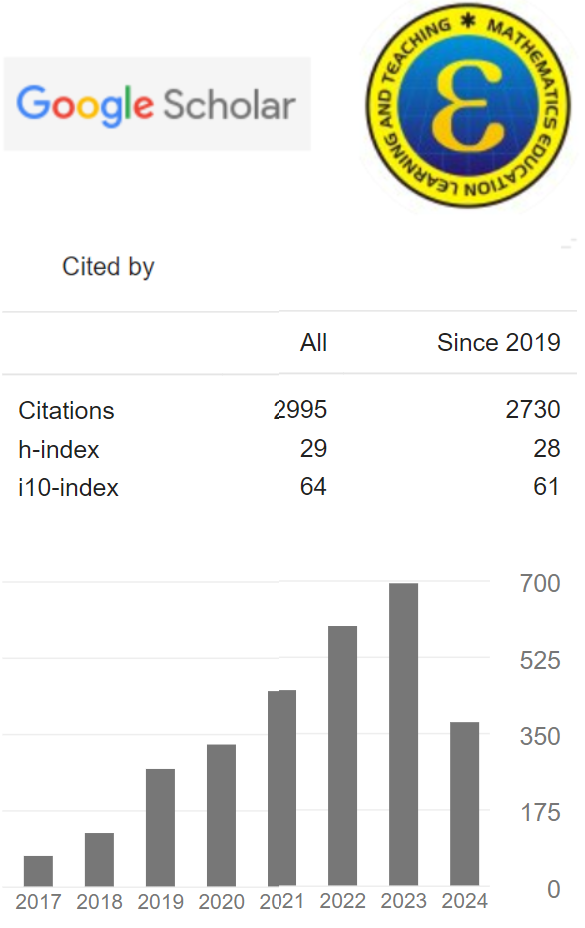Digital Competence of Post-Pandemic Teachers Based on Gender, Work Period, and Certification Factors
(1) IAIN Syekh Nurjati Cirebon
(2) IAIN Syekh Nurjati Cirebon
(3) IAIN Syekh Nurjati Cirebon
(*) Corresponding Author
Abstract
Keywords
Full Text:
PDFReferences
Adiyanta, F. S. (2019). Hukum dan studi penelitian empiris: Penggunaan metode survey sebagai instrumen penelitian hukum empiris. Administrative Law and Governance Journal, 2(4), 697-709. https://doi.org/10.14710/alj.v2i4.697-709
Anggrasari, L. A. (2020). Penerapan e-learning untuk meningkatkan kemampuan literasi digital di era new normal. Premiere Educandum: Jurnal Pendidikan Dasar Dan Pembelajaran, 10(2), 248. https://doi.org/10.25273/pe.v10i2.7493
Bond, M., MarÃn, V. I., Dolch, C., Bedenlier, S., & Zawacki-Richter, O. (2018). Digital transformation in German higher education: student and teacher perceptions and usage of digital media. International Journal of Educational Technology in Higher Education, 15(1), 1-20. https://doi.org/10.1186/s41239-018-0130-1
Ghofur, A., Nafisah, D., Eryadini, N., Astutik, N. F. W., & Suryanto, H. (2021). Pelatihan Pengembangan Desain Video Pembelajaran Interaktif. Panrannuangku Jurnal Pengabdian Masyarakat, 1(1), 29-36. https://doi.org/10.35877/panrannuangku480
Ghomi, M., & Redecker, C. (2019, May). Digital Competence of Educators (DigCompEdu): Development and Evaluation of a Self-assessment Instrument for Teachers' Digital Competence. In CSEDU (1) (pp. 541-548). https://doi.org/10.5220/0007679005410548
Godhe, A. L., Magnusson, P., & Hashemi, S. S. (2020). Adequate digital competence. Educare-vetenskapliga skrifter, (2), 74-91. https://doi.org/10.24834/educare.2020.2.4
Hidayanto, S., & Akbar, M. R. (2022). Webinar Manajemen Privasi dan Keamanan Digital di Era Internet untuk Gen Z di SMP Islam Al Azhar 9 Kemang Pratama Bekasi, Jawa Barat. MONSU'ANI TANO Jurnal Pengabdian Masyarakat, 5(1), 15-28. https://doi.org/10.32529/tano.v5i1.1135
Ilomäki, L., Paavola, S., Lakkala, M., & Kantosalo, A. (2016). Digital competence–an emergent boundary concept for policy and educational research. Education and information technologies, 21(3), 655-679. https://doi.org/10.1007/s10639-014-9346-4
Irman, S. (2020). Validasi Modul Berbasis Project Based Learning pada Mata Pelajaran Simulasi dan Komunikasi Digital. Jurnal Imiah Pendidikan dan Pembelajaran, 4(2), 260-269. https://doi.org/10.23887/jipp.v4i2.26156
Karsenti, T., Kozarenko, O. M., & Skakunova, V. A. (2020). Digital technologies in teaching and learning foreign languages: Pedagogical strategies and teachers’ professional competence. Education and Self Development, 15(3), 76-88. https://doi.org/10.26907/esd15.3.07
Lund, A., Furberg, A., Bakken, J., & Engelien, K. L. (2014). What does professional digital competence mean in teacher education?. Nordic journal of digital literacy, 9(4), 280-298. https://doi.org/10.18261/issn1891-943x-2014-04-04
Mulyo, A. M. (2022). Konsepsi Literasi Digital Di Kalangan Mahasiswa (Doctoral dissertation, Universitas Pendidikan Indonesia). Retrieved from https://series.gci.or.id/article/560/22/uinibicie-2021
Newland, B., & Handley, F. (2016). Developing the digital literacies of academic staff: An institutional approach. Research in Learning Technology, 24(1), 1–12. https://doi.org/10.3402/rlt.v24.31501
Pettersson, F. (2018). On the issues of digital competence in educational contexts–a review of literature. Education and information technologies, 23(3), 1005-1021. https://doi.org/10.1007/s10639-017-9649-3
Portillo, J., Garay, U., Tejada, E., & Bilbao, N. (2020). Self-perception of the digital competence of educators during the COVID-19 pandemic: A cross-analysis of different educational stages. Sustainability, 12(23), 10128. https://doi.org/10.3390/su122310128
Prayogi, R. D. (2020). Kecakapan abad 21: Kompetensi digital pendidik masa depan. Manajemen Pendidikan, 14(2). https://doi.org/10.23917/jmp.v14i2.9486
Rahayu, J., & Solihatin, E. (2019). Pengembangan Modul Pembelajaran Online Pada Mata Pelajaran Kimia. Jurnal Ilmiah Wahana Pendidikan, 5(1), 13-28. Retrieved from https://jurnal.peneliti.net/index.php/JIWP/article/view/71
Riyanto, O. R. (2016). Teknik Pembelajaran E-learning dengan LMS Moodle: untuk pemula. Yogyakarta: Deepublish.
Sidyawati, L., Aviccienna, N. A., & Mahayasa, W. (2021). Literasi Keamanan Digital Untuk Meningkatkan Etika Berinternet Yang Aman Bagi Warga Desa Donowarih. Community Development Journal: Jurnal Pengabdian Masyarakat, 2(3), 696-701. https://doi.org/10.31004/cdj.v2i3.1962
Spiteri, M., & Chang Rundgren, S. N. (2020). Literature review on the factors affecting primary teachers’ use of digital technology. Technology, Knowledge and Learning, 25(1), 115-128. https://doi.org/10.1007/s10758-018-9376-x
Supriatna, A. (2018). Kegiatan Lesson Study sebagai Upaya Guru untuk Menemukan Pembelajaran yang Memenuhi Keperluan Anak Hidup pada Zamannya (Era Revolusi Industri 4.0). In Prosiding Seminar Nasional & Internasional (Vol. 1, No. 1).
Syafa’at, W. (2020). Peningkatan Sumber Daya Manusia Guru di SMPI Brawijaya Pungging melalui Budaya Literasi Digital. Al-Muttaqin : Jurnal Studi, Sosial, dan Ekonomi, 1(1), 57–67. Retrieved from https://staisam.ac.id/jurnal/index.php/almuttaqin/article/view/6
Udin, T., Maufur, S., & Riyanto, O. R. (2022). Student’s Selfâ€Efficacy and Perceptions of Online Learning on the Use Learning Management System. Journal of Education Technology, 6(1). https://doi.org/10.23887/jet.v6i1.41884
Caberoâ€Almenara, J., Guillénâ€Gámez, F. D., Ruizâ€Palmero, J., & Palaciosâ€RodrÃguez, A. (2022). Teachers' digital competence to assist students with functional diversity: Identification of factors through logistic regression methods. British Journal of Educational Technology, 53(1), 41-57. https://doi.org/10.1111/bjet.13151
Moorhouse, B. L., & Kohnke, L. (2022). Conducting formative assessment during synchronous online lessons: university teachers’ challenges and pedagogical strategies. Pedagogies: An International Journal, 1-19. https://doi.org/10.1016/s2213-2600(21)00186-7
Starkey, L. (2020). A review of research exploring teacher preparation for the digital age. Cambridge Journal of Education, 50(1), 37-56. https://doi.org/10.1080/0305764x.2019.1625867
Hatlevik, O. E., Ottestad, G., & Throndsen, I. (2015). Predictors of digital competence in 7th grade: a multilevel analysis. Journal of Computer Assisted Learning, 31(3), 220-231. https://doi.org/10.1111/jcal.12065
Caena, F., & Redecker, C. (2019). Aligning teacher competence frameworks to 21st century challenges: The case for the European Digital Competence Framework for Educators (Digcompedu). European Journal of Education, 54(3), 356-369. https://doi.org/10.1111/ejed.12345
Asmarani, A., El Widdah, M., Putra, D., & Fadhil, M. (2022). Analysis of Competence and Use of Information Technology and Its Effect on Teachers Performance. AL-TANZIM: Jurnal Manajemen Pendidikan Islam, 6(2), 393-407. https://doi.org/10.33650/al-tanzim.v6i2.3377
Indriyani, V. (2019, August). Digital literacy competencies for teacher education students. In 1st International Conference on Education Social Sciences and Humanities (ICESSHum 2019) (pp. 1010-1018). Atlantis Press. https://doi.org/10.2991/icesshum-19.2019.156
Sá, M. J., Santos, A. I., Serpa, S., & Miguel Ferreira, C. (2021). Digitainability—Digital competences post-COVID-19 for a sustainable society. Sustainability, 13(17), 9564. https://doi.org/10.3390/su13179564
Nowak, B. M. (2019). The Development of Digital Competence of Students of Teacher Training Studies--Polish Cases. International Journal of Higher Education, 8(6), 262-266. https://doi.org/10.5430/ijhe.v8n6p262
Heuling, L. S., Wild, S., & Vest, A. (2021). Digital Competences of Prospective Engineers and Science Teachers: A Latent Profile and Correspondence Analysis. International Journal of Education in Mathematics, Science and Technology, 9(4), 760-782. https://doi.org/10.46328/ijemst.1831
DOI: 10.24235/eduma.v11i2.11751
Article Metrics
Abstract view : 26 timesPDF - 7 times
Refbacks
- There are currently no refbacks.
Copyright (c) 2022 Eduma : Mathematics Education Learning and Teaching


.png)










